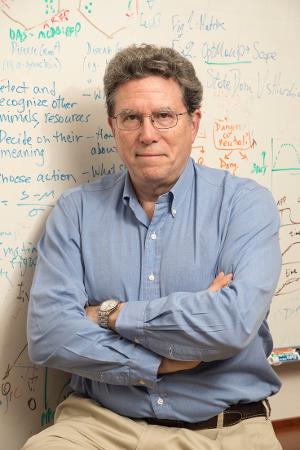
On Wednesday, December 9 at 5 p.m. Pacific Time, David J. Anderson, Caltech's Seymour Benzer Professor of Biology; the Tianqiao and Chrissy Chen Institute for Neuroscience Leadership Chair; director of the Tianqiao and Chrissy Chen Institute for Neuroscience; and a Howard Hughes Medical Institute Investigator, continues the 2020-2021 Watson Lecture season by exploring "The Inner Life of the Brain: Fear, Sex, and Violence."
Behaviors that are fundamental to animal survival, such as mating and the fight-or-flight response, are driven by internal emotional states. In humans, these brain states are subjectively experienced as "feelings," such as desire, rage, or terror. Understanding the brain mechanisms that govern these states, using powerful new tools such as optogenetics and calcium imaging, will lead to better treatments for psychiatric disorders. However, sucha??studies can only be performeda??in animal models. How can we study an animal's internal state when we do not know if it has subjective feelings?
In this lecture, Anderson will describe a new approach to this problem, which allows the neurobiology of emotional states to be studied in diverse animal species without reference to subjective feelings.
David J. Anderson has been on the Caltech faculty since 1986. He received his AB from Harvard College in 1978, did his PhD training with the late Günter Blobel, a Nobel laureate at The Rockefeller University, and did his postdoctoral work with Richard Axel, a Nobel laureate at Columbia University. He is an alumnus of the 1979 MBL Neurobiology Course. Anderson's research career has spanned multiple topics in neuroscience, from the study of neural crest stem cells that generate the developing peripheral nervous system to the neural circuits that mediate innate emotional behaviors, such as fear and aggression. He has published more than 225 primary research articles and is the co-author, with Caltech colleague Ralph Adolphs, of The Neuroscience of Emotion: A New Synthesis (2018, Princeton University Press).
Anderson has trained more than 50 PhD students and postdoctoral fellows. He was elected to the American Academy of Arts and Sciences (2002) and the U.S. National Academy of Sciences (2007), and is a recipient of the 2017 Perl-UNC Neuroscience Prize and the 2018 Edward M. Scolnick Prize in Neuroscience from MIT. Anderson played a key role as an adviser to the late Paul Allen in the founding of the Allen Institute and the creation of the Allen Brain Atlas, and continues to serve as an adviser to that institute. He has also served on two working groups for the NIH's BRAIN (Brain Research through Advancing Innovation in Neurotechnology) Initiative.
Anderson is actively engaged in the public communication of science; his work has been featured in The New York Times, BBC News, and NPR's All Things Considered. He has also appeared as an expert panelist in episodes of
Charlie Rose's The Brain Series and delivered a TEDx talk that has received almost 1.5 million views.
This event is free and open to the public.
Advance registration is required. The lecture will begin at 5 p.m. and runs approximately 45 minutes, followed by live audience Q&A with Anderson. After the live webinar, the lecture (without Q&A) will be available for on-demand viewing on
Caltech's YouTube channel.
Since 1922, The Earnest C. Watson Lectures have brought Caltech's most innovative scientific research to the public. The series is named for Earnest C. Watson, a professor of physics at Caltech from 1919 until 1959. Spotlighting a small selection of the pioneering research Caltech's professors are currently conducting, the Watson Lectures are geared toward a general audience as part of the Institute's ongoing commitment to benefiting the local community through education and outreach. Through a gift from the estate of Richard C. Biedebach, the lecture series has expanded to also highlight one assistant professor's research each season.
Watson Lectures are part of the Caltech Signature Lecture Series, presented by Caltech Public Programming, which offers a deep dive into the groundbreaking research and scientific breakthroughs at Caltech and JPL. For information please visit:
caltech.edu/watson.
Comments
To post a comment, you must
register and
login.

![]()


